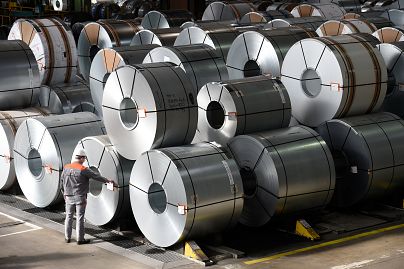US import tariffs on steel and aluminium from the EU, Canada and Mexico - and likely retaliation - threaten an all-out trade war.
US President Donald Trump has long railed that American jobs are being lost because of unfair global trade, threatening to act to protect the US economy.
 ADVERTISEMENT
ADVERTISEMENT
 ADVERTISEMENT
ADVERTISEMENT
The huge tariffs now being imposed on metal imports from the EU, Canada and Mexico translate his aggressive rhetoric into policy.
The US leader, backed by key advisers, argues that the US has the lowest tariff barriers in the world, and the outside world including Europe has long taken advantage.
There was uncertainty over whether the EU would be exempt, but talks broke down and that uncertainty is now over.
Earlier this week the Organisation for Economic Cooperation and Development (OECD) warned in a report on the world economy that trade restrictions, if implemented, “would negatively influence investment and jobs”.
‘Thousands of jobs’ at risk in Europe
The European Steel Association (Eurofer) told Euronews this week that the EU was "at the front door of a trade war". It has warned that the impact of planned US import tariffs might be devastating and the EU would suffer most.
Its director general, Axel Eggert, says US tariffs could threaten thousands of jobs in a European industry that employs well over 300,000.
Germany employs the highest number of people in steel manufacturing, with around 85,000 workers. More than 30,000 work in the UK steel industry. Eurofer has estimated that up to 140,000 jobs indirectly linked to European steel manufacturing could be at risk.
Consumers are also likely to suffer from the higher tariffs. Higher raw material costs would force manufacturers to hike prices, leading in turn to more expensive goods in the shops.
Some analysts play down the effect on the wider economy. The think-tank ING has estimated that the direct impact on the EU economy may be limited. It points out that 88% of the bloc’s steel exports go to destinations other than the US, while acknowledging that Greece, Sweden and the UK are more exposed than most to the US market, as are Austria, France, Italy and the UK in aluminium.
The real danger, analysts say, lies in a potential escalation into a wider trade war.
Bad news for beer?
In the short term, economists say steel import tariffs in the US can help local producers, as the cost of foreign products is driven up.
However, other manufacturers are likely to see costs rise as they still rely on imported steel. The Coalition of American Metal Manufacturers and Users is one of several industry bodies to warn of the impact, saying the US tariffs on allies “places American manufacturers directly in harm’s way”.
That, in turn, may lead to higher consumer prices. The US brewing industry has warned that the tariffs are bad news for beer drinkers, due to the increased cost of aluminium.
One estimate, from consultants Trade Partnership Worldwide, has predicted that the tariffs will lead to a net loss of 146,000 American jobs. “Overall, more than five jobs would be lost for every one gained,” said its report in March.
The same analysts believe the impact of retaliation against the US threaten nearly 470,000 US jobs, with over 18 lost for each one gained.
Bad news for beer
Brussels is to take the case to the World Trade Organisation. The European Union has yet to announce specific retaliatory action, but the Commission has listed several American products it has in its sights.
Some, like jeans, have a symbolic value. Around a third are linked to agriculture, such as orange juice, peanut butter, rice, cranberries and kidney beans. Iron and steel goods are also on the list.
ING analysts believe the effect of the retaliation on the US economy will be “negligible” but could have important political effect by targeting important American politicians’ constituencies.
Bourbon is most associated with Kentucky, the home state of Senator Mitch McConnell, its report points out. Harley-Davidson motorbikes, another likely target, are made in Wisconsin — the home state of House of Representatives Speaker Paul Ryan, a Republican who opposes the tariffs.
Canada has announced tariffs covering nearly €11 billion on US imports, including whisky, orange juice, steel and aluminium. Mexico’s measures target various farm and industrial products including pork, apples, grapes, cheese as well as steel.
How bad could this become?
That’s the big unknown, but there are reasons to believe this could get more serious. The conflict embroils the world’s three largest economies – the US, the EU and China.
ING estimates that an all-out trade war could hit GDP by 0.3%for the EU and 0.4% for the US.
Trump imposed tariffs on steel and aluminium without the consent of Congress by resorting to a 1962 law relating to national security. An investigation by his administration concluded that the competition from foreign imports amounted to a threat, by undermining American production.
Last week the president launched a similar inquiry into car and truck imports. He has threatened further action should the EU retaliate. The US is estimated to import vehicles worth more than €17 billion from Germany, and over €7 billion from the UK.
Analysts doubt that Trump could convincingly link cars to national security in the same way he has with steel and aluminium.
However, whether or not future action is deemed technically legal may not deter the US president, who has long set his sights on the global post-war trading system.












